#nyctibiiformes
Explore tagged Tumblr posts
Note
Potoo, perhaps? They look like muppets.
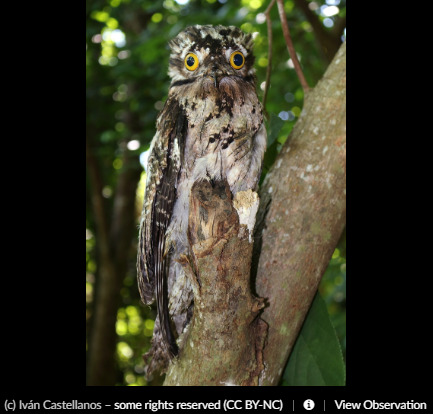
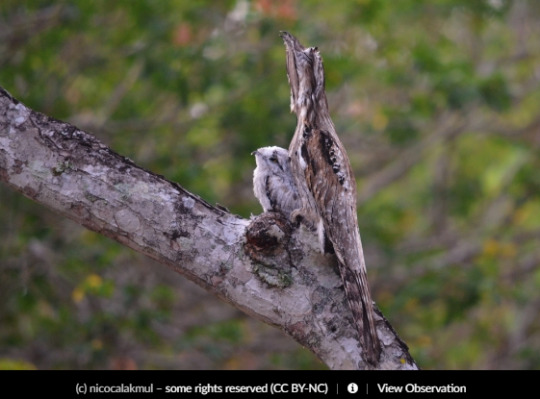
#central and south america#potoo#potoo bird#bird#birds#central american bird#south american birds#strisores#vanescaves#nyctibiiformes#nyctibiidae#animal polls#poll blog#my polls#animals#polls#tumblr polls
42 notes
·
View notes
Text

Rufous Potoo (Phyllaemulor bracteatus), family Nyctibiidae, order Nyctibiiformes, Ecuador
Photograph by Supreet Sahoo
538 notes
·
View notes
Text
Round 3 - Reptilia - Nyctibiiformes




(Sources - 1, 2, 3, 4)
Our next strisorean bird order is the Nyctibiiformes, commonly called “potoos”. This order consists of one family, Nyctibiidae, containing 7 species within 2 genera.
Potoos are known for their large, sometimes bright yellow eyes, their broad mouths, and short bills. As members of the clade Strisores, they have a body resembling nightjars, though they are larger. They have proportionally large heads for their body size and long wings and tails. Like nightjars, they are nocturnal insectivores which spend their day sleeping perched on tree stumps camouflaged to look like part of the stump. Unlike nightjars, they lack rictal bristles around their mouth. Potoos hunt from a perch, watching for insects and then darting after them, then returning to their perch. They mainly eat flying beetles, but will also eat moths, grasshoppers, and termites, and even small birds. They live only within Central and South America.
Potoos lay a single spotted egg directly on top of a stump. They are monogamous and both parents incubate the egg and raise their chick. One parent, often the male, incubates the egg during the day, while the duties are shared during the night. The chick hatches about one month after laying and the nestling phase is two months. The plumage of nestling potoos is white and once they are too large to hide under their parents they adopt the same frozen, camouflaged position as their parents, resembling clumps of fungus.
Strisores have a well-represented fossil record, with fossils of most major strisorean lineages known from the Paleogene. Strisores evolved in the Eocene, with the two main extant lineages of separating about 60–55 million years ago. At around 40 mya, the common ancestors of Caprimulgidae and Nyctibiidae diverged from those of the oilbird and frogmouths.
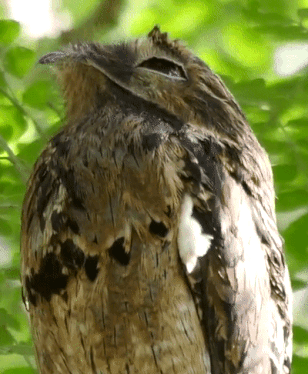
Propaganda under the cut:
Potoos are sometimes called “Poor-me-ones”, after the sound of their haunting calls.
While today potoos live only in Central and South America, fossil evidence indicates that they also inhabited Europe during the Paleogene.
The bright yellow, reflective eyes of potoos could be conspicuous to potential predators during the day, so they have unusual slits in their eyelids, which allow them to sense movement even when their eyes are closed.
Should a potoo sense potential danger it will adopt a "freeze" position with its feathers flattened, perfectly camouflaged against its chosen perch. The transition between perching and the freeze position is gradual and hardly perceptible to the observer.

(source)
If the freeze position is not affective, the potoo will then attempt to surprise and intimidate a predator by opening its eyes and beak wide while vocalizing, giving it a chance to fly out of reach (image 3).
#I love them but also they scare me so bad#a considerable effort to find photos that don’t look like bird body horror#animal polls#round 3#reptilia#Nyctibiiformes
75 notes
·
View notes
Text
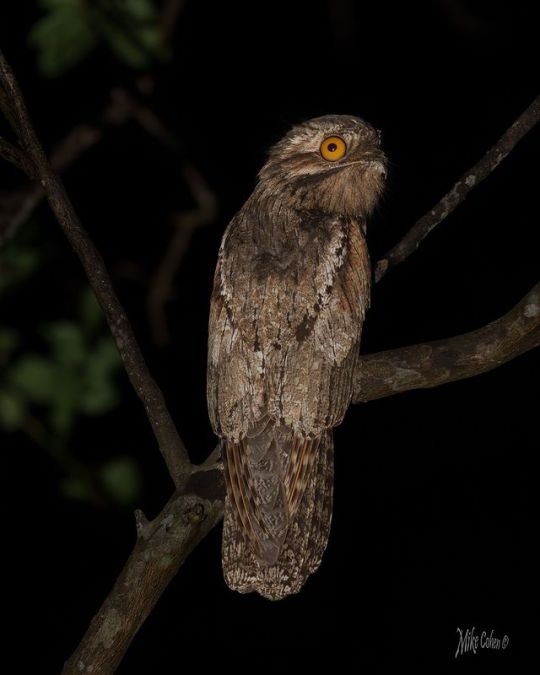
Common Potoo
76 notes
·
View notes
Text
close! Potoos are closely related to the frogmouths and nightjars, so they all share some traits, like large mouths, camouflage that resembles tree bark, and being nocturnal. It's easy to mistake them for each other.
Potoos are found in tropical parts of the Americas, from Mexico to Argentina. Other names for potoos include kakuy/cacuy or urutau!
Here's a picture of the common potoo, which closely resembles the one in the drawings! (i'm not exactly sure which species the artist based their art on, they all look pretty similar and I haven't studied them very much)

(via)
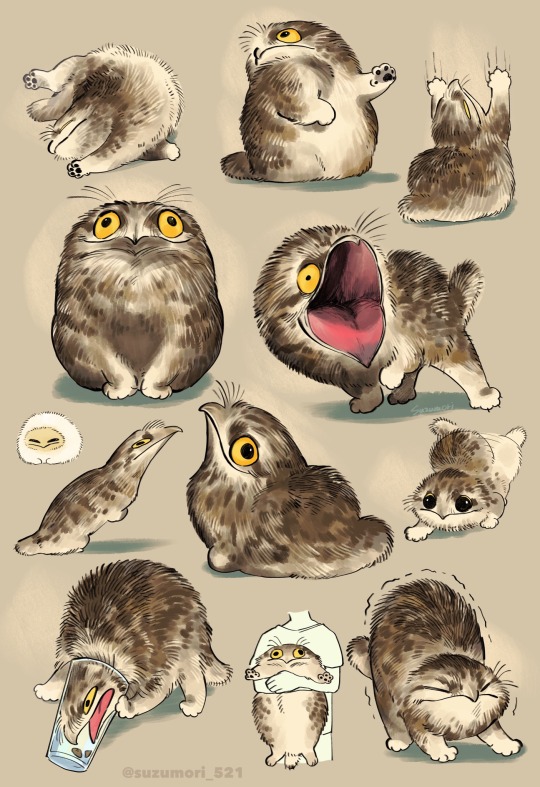
The name of this creature is YOTAcat or POTOOcat.
This creature is a combination of Yotaka (potoo) and cat.
His true identity is one of an alien reconnaissance unit that plans to invade the earth.
His body can change its shape at will by copying other creatures and objects.
When he came to Earth, he first tried to copy the appearance of the planet's main life form.
However, the first thing he saw there was a cat. He decided that the creature was the main life form and tried to copy the cat's form.
However, by some accident, he also copied the information of Potoo, and his body became a chimera of cat and Potoo.
What was even more unexpected for these aliens was that once they copied the earth creatures, the original spirit invaded their psyche.
His spirit was about to be taken over by cats and POTOO!
The human who found the strange creature brought it home out of curiosity. Not knowing it was a vicious alien.......
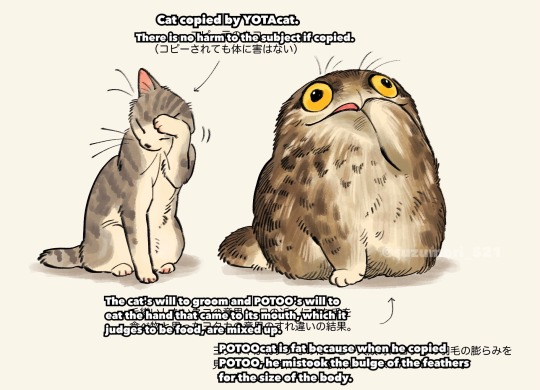
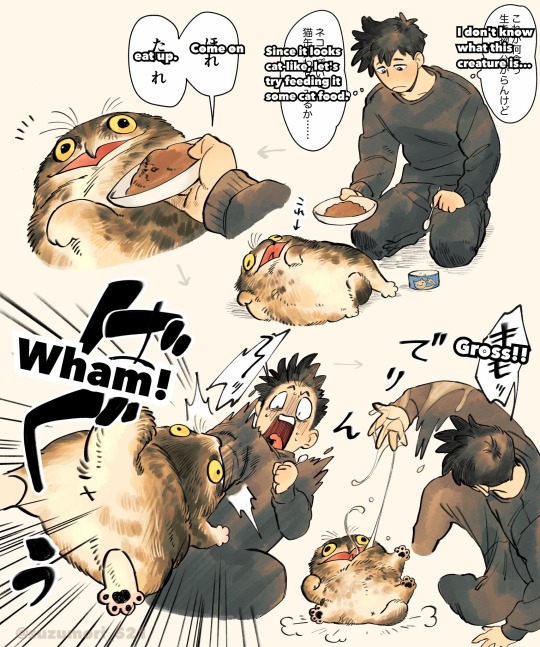
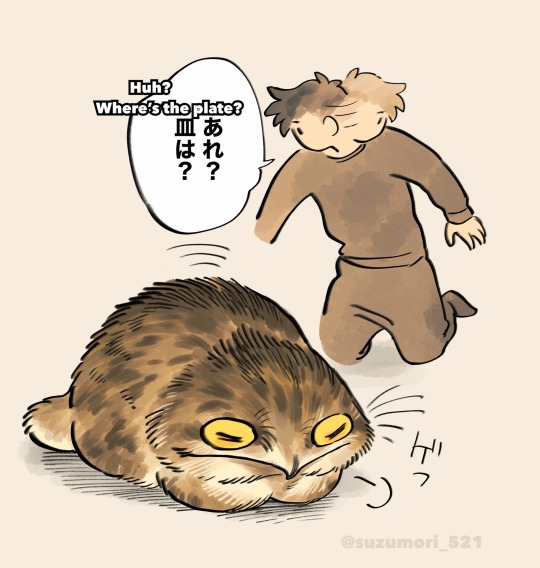
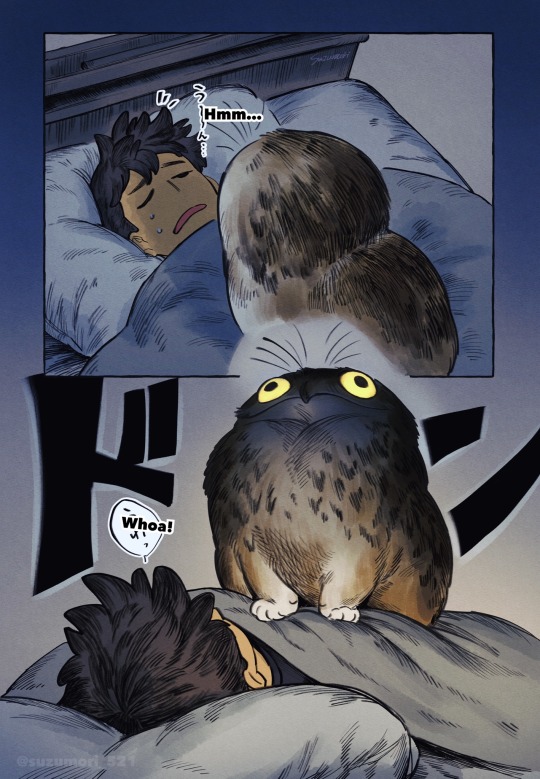
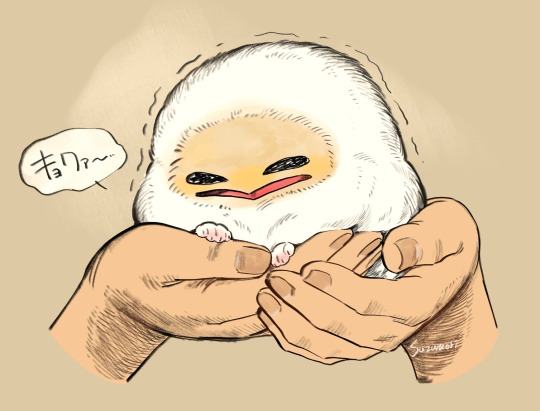
41K notes
·
View notes
Photo

Common Potoo (Nyctibius griseus)
© Nicolás Bejarano
66 notes
·
View notes
Photo

Common Potoo (Nyctibius griseus)
© Nicolás Bejarano
7 notes
·
View notes
Photo

Mãe-da-lua O mãe_da-lua é uma ave da ordem Nyctibiiformes da família Nyctibiidae. Conhecido também como urutau, urutau-comum, urutágua, urutágo, Kúa-kúa e Uruvati (nomes indígenas - Mato Grosso). O nome urutau é tupi e significa “ave fantasma”. Há uma crendice na Amazônia de que as penas da cauda do urutau protegeriam a castidade. Por isso, a mãe varre debaixo das redes das meninas com uma vassoura confeccionada com estas penas. Conta uma famosa lenda boliviana, que na densa mata habitava a bela filha do cacique de certa tribo, enamorada por um jovem guerreiro da mesma tribo, a quem amava profundamente. Amava e era amada. Ao saber do romance, o pai da menina, enfurecido pelo ciúmes, usou suas artes mágicas e tomou a decisão de acabar com o namoro da maneira mais trágica: matar o pretendente. Ao sentir o desaparecimento de seu amado, a jovem índia entrou na selva para procurá-lo. Enorme foi sua surpresa ao perceber o terrível fato. Em estado de choque, voltou para casa e ameaçou contar tudo à comunidade. O velho pai, furioso, a transformou em uma ave noturna para que ninguém soubesse do acontecido. Porém, a voz da menina passou à ave. Por isso, durante as noites, ela sempre chora a morte de seu amado com um canto triste e melancólico. https://www.instagram.com/p/CJRQAhSsKyJ-OwSLac4DseX_W7tHXlh3uL8TPE0/?igshid=1hpty1dme3r1j
0 notes
Text

[2626/11080] Common potoo - Nyctibius griseus
Order: Nyctibiiformes (potoos) Family: Nyctibiidae
Photo credit: Martjan Lammertink via Macaulay Library
109 notes
·
View notes
Text

Northern Potoo (Nyctibius jamaicensis ), mother and chick, family Nyctibiidae, order Nyctybiiformes, Costa Rica
Potoos used to be in the same order as nightjars, but are now placed in their own order.
photograph by Alvaro Cubero
2K notes
·
View notes
Text
This is not an owl is a Brazilian bird called Urutau.
The urutaus are a group of nocturnal birds restricted to the Neotropics of South America, which belong to the genus Nyctibius, of the family Nyctibiidae and order Nyctibiiformes. They are also called mother-of-the-moon and stump-splicing.
- Wikipedia
30K notes
·
View notes
Text
🦅 Reptilia Round-up and Mini Stat Post 🦅
This is a round-up of the points earned so far!
Having observed voter turn-out for this round, I am placing the cut-off point at 900. Meaning that any order which earned (or earns) over 900 points will be moving on to Round 4!
We still have a ways for go til the end of Round 3, but here’s how everyone stacks up so far:
1. Passeriformes (“passerines”) ~ 3035
2. Accipitriformes (“hawks”, “eagles”, “vultures”, and kin) ~ 2884
3. Carnivora (feliforms and caniforms) ~ 1678
4. Rodentia ~ 1675
5. Artiodactyla (“even-toed ungulates”) ~ 1320
6. Squamata (“Lizards”) ~ 1207
7. Charadriiformes (“shorebirds”) ~ 1195
8. Psittaciformes (“parrots”) ~ 1102
9. Columbiformes (“pigeons” and “doves”) ~ 1,088
10. Crocodylia (“crocodilians”) ~ 1060
11. Strigiformes (“owls”) ~ 1043
12. Cuculiformes (“cuckoos”) ~ 1,027
13. Orectolobiformes (“carpet sharks”) ~ 989
14. Falconiformes (“falcons”) ~ 961
15. Pilosa (“sloths” and “anteaters”) ~ 940
16. Galliformes (“landfowl”) ~ 897
17. Testudines (“Turtles”) ~ 883
18. Lagomorpha (“rabbits” and “pikas”) ~ 867
19. Suliformes (suliform waterbirds) ~ 858
20. Piciformes (“woodpeckers”, “toucans”, “barbets”, and kin) ~ 858
21. Sphenisciformes (“penguins”) ~ 841
22. Apterygiformes (“kiwis”) ~ 837
23. Lamniformes (“mackerel sharks”) ~ 835
24. Chiroptera (“bats”) ~ 825
25. Myliobatiformes (“stingrays”) ~ 813
26. Pelecaniformes (“pelicans”, “herons”, “ibises”, “Shoebill”, and kin) ~ 810
27. Monotremata (“platypus” and “echidnas”) ~ 794
28. Apodiformes (“hummingbirds” and “swifts”) ~ 794
29. Anseriformes (“waterfowl”) ~ 761
30. Carcharhiniformes (“ground sharks”) ~ 758
31. Pholidota (“pangolins”) ~ 734
32. Coraciiformes (“rollers”, “kingfishers”, “bee-eaters”, and kin) ~ 719
33. Gaviiformes (“loons/divers”) ~ 714
34. Sirenia (“sea cows”) ~ 704
35. Didelphimorphia (“opossums”) ~ 696
36. Gruiformes (“cranes”, “rails”, “flufftails”, and kin) ~ 680
37. Caprimulgiformes (“nightjars”) ~ 676
38. Eulipotyphla (“moles”, “shrews”, “hedgehogs”, and kin) ~ 674
39. Procellariiformes (“petrels” and “albatrosses”) ~ 673
40. Dasyuromorphia (“carnivorous marsupials”) ~ 669
41. Rhynchocephalia (“Tuatara”) ~ 665
42. Perissodactyla (“odd-toed ungulates”) ~ 654
43. Casuariiformes (“cassowaries” and “Emu”) ~ 647
44. Primates ~ 642
45. Nyctibiiformes (“potoos”) ~ 627
46. Bucerotiformes (“hornbills” and “hoopoes”) ~ 619
47. Opisthocomiformes (“Hoatzin”) ~ 594
48. Cingulata (“armadillos”) ~ 578
49. Diprotodontia (all the other marsupials) ~ 576
50. Phoenicopteriformes (“flamingos”) ~ 569
51. Squatiniformes (“angel sharks”) ~ 568
52. Squaliformes (“sleeper sharks”, “dogfish”, “lantern sharks”, and kin) ~ 567
53. Rhinopristiformes (“guitarfish”, “wedgefish”, “sawfish”, and kin) ~ 561
54. Tubulidentata (“Aardvark”) ~ 557
55. Proboscidea (“elephants”) ~ 554
56. Podicipediformes (“grebes”) ~ 540
57. Heterodontiformes (“bullhead sharks”) ~ 524
58. Podargiformes (“frogmouths”) ~ 508
59. Ciconiiformes (“storks”) ~ 507
60. Trogoniformes (“trogons”) ~ 497
61. Chimaeriformes (“chimaeras”) ~ 478
62. Hexanchiformes (“cow sharks” and “frilled sharks”) ~ 475
63. Eurypygiformes (“Kagu” and “Sunbittern”) ~ 464
64. Steatornithiformes (“Oilbird”) ~ 452
65. Rajiformes (“skates”) ~ 437
66. Macroscelidea (“elephant shrews”) ~ 422
67. Aegotheliformes (“owlet-nightjars”) ~ 418
68. Afrosoricida (“otter shrews”, “tenrecs”, and “golden moles”) ~ 394
69. Leptosomiformes (“Cuckoo-roller”) ~ 394
70. Struthioniformes (“ostriches”) ~ 388
71. Cariamiformes (“seriemas”) ~ 385
72. Phaethontiformes (“tropicbirds”) ~ 383
73. Pterocliformes (“sandgrouses”) ~ 381
74. Peramelemorphia (“bandicoots” and “bilbies”) ~ 379
75. Tinamiformes (“tinamous”) ~ 373
76. Musophagiformes (“turacos”) ~ 373
77. Dermoptera (“colugos”) ~ 349
78. Pristiophoriformes (“saw sharks”) ~ 335
79. Rheiformes (“rheas”) ~ 331
80. Microbiotheria (“Monito del Monte”) ~ 327
81. Otidiformes (“bustards”) ~ 321
82. Mesitornithiformes (“mesites”) ~ 303
83. Hyracoidea (“hyraxes”) ~ 285
84. Coliiformes (“mousebirds”) ~ 281
85. Scandentia (“treeshrews”) ~ 277
86. Torpediniformes (“electric rays”) ~ 268
87. Paucituberculata (“shrew opossums”) ~ 253
88. Notoryctemorphia (“marsupial moles”) ~ 208
1️⃣ Ranks of single species so far 1️⃣
1. Tuatara (Sphenodon punctatus) ~ 665
2. Hoatzin (Opisthocomus hoazin) ~ 594
3. Aardvark (Orycteropus afer) ~ 557
4. Oilbird (Steatornis caripensis) ~ 452
5. Cuckoo-roller (Leptosomus discolor) ~ 394
6. Monito del Monte (Dromiciops gliroides) ~ 327
7. Limnognathia maerski ~ 124 (Note: a new species has since been described in this phylum but as Round 1 happened before the paper it wasn’t included in Round 1)
Extra Stats:
✔️ Most Votes so far ⬆️
Reptilian Order Accipitriformes (“hawks”, “eagles”, “vultures”, and kin) ~ 797
Reptilian Order Passeriformes (“passerines”) ~ 755
Mammalian Order Rodentia (rodents) ~ 492
Mammalian Order Artiodactyla (“even-toed ungulates”) ~ 376
Mammalian Order Carnivora (feliforms and caniforms) ~ 368
✔️Least Votes so far ⬇️
Chondrichthyan Order Torpediniformes (“electric rays”) ~ 140
Chondrichthyan Order Pristiophoriformes (“saw sharks”) ~ 163
Mammalian Order Notoryctemorphia (“marsupial moles”) ~ 169
Reptilian Order Musophagiformes (“turacos”) ~ 171
Reptilian Order Otidiformes (“bustards”) ~ 173
🥰 Most Favorites so far ⬆️
Reptilian Order Passeriformes (“passerines”) ~ 452
Reptilian Order Accipitriformes (“hawks”, “eagles”, “vultures”, and kin) ~ 321
Mammalian Order Carnivora (feliforms and caniforms) ~ 301
Mammalian Order Rodentia (rodents) ~ 183
Mammalian Order Artiodactyla (“even-toed ungulates”) ~ 165
😑 Least Favorites so far ⬇️
Mammalian Order Notoryctemorphia (“marsupial moles”) ~ 5
Mammalian Order Paucituberculata (“shrew opossums”) ~ 6
Chondrichthyan Order Torpediniformes (“electric rays”) ~ 7
Reptilian Order Leptosomiformes (“Cuckoo-roller”) ~ 8
Mammalian Order Hyracoidea (“hyraxes”) ~ 9
Reptilian Order Otidiformes (“bustards”) ~ 9
❤️ Most Loves so far ⬆️
Reptilian Order Accipitriformes (“hawks”, “eagles”, “vultures”, and kin) ~ 403
Reptilian Order Passeriformes (“passerines”) ~ 243
Mammalian Order Rodentia (rodents) ~ 233
Reptilian Order Cuculiformes (“cuckoos”) ~ 182
Reptilian Order Crocodylia (“crocodilians”) ~ 166
💔 Least Loves so far ⬇️
Mammalian Order Notoryctemorphia (“marsupial moles”) ~ 37
Mammalian Order Paucituberculata (“shrew opossums”) ~ 46
Mammalian Order Scandentia (“treeshrews”) ~ 46
Mammalian Order Hyracoidea (“hyraxes”) ~ 53
Mammalian Order Microbiotheria (“Monito del Monte”) ~ 54
👍 Most Likes so far ⬆️
Reptilian Order Leptosomiformes (“Cuckoo-roller”) ~ 116
Reptilian Order Struthioniformes (“ostriches”) ~ 109
Reptilian Order Rheiformes (“rheas”) ~ 96
Mammalian Order Microbiotheria (“Monito del Monte”) ~ 92
Reptilian Order Tinamiformes (“tinamous”) ~ 92
✋ Least Likes so far ⬇️
Mammalian Order Carnivora (feliforms and caniforms) ~ 7
Reptilian Order Apodiformes (“hummingbirds” and “swifts”) ~ 25
Reptilian Order Strigiformes (“owls”) ~ 27
Reptilian Order Caprimulgiformes (“nightjars”) ~ 32
Mammalian Order Chiroptera (“bats”) ~ 34
😐 Most Neutral votes so far ⬆️
Mammalian Order Notoryctemorphia (“marsupial moles”) ~ 51
Mammalian Order Paucituberculata (“shrew opossums”) ~ 50
Mammalian Order Scandentia (“treeshrews”) ~ 37
Mammalian Order Hyracoidea (“hyraxes”) ~ 33
Mammalian Order Primates ~ 29
😮 Least Neutral votes so far ⬇️
Reptilian Order Galliformes (“landfowl”) ~ 0
Reptilian Order Strigiformes (“owls”) ~ 0
Reptilian Order Charadriiformes (“shorebirds”) ~ 1
Reptilian Order Apodiformes (“hummingbirds” and “swifts”) ~ 1
Reptilian Order Accipitriformes (“hawks”, “eagles”, “vultures”, and kin) ~ 1
👎 Most Dislikes so far ⬆️
Mammalian Order Primates ~ 12
Reptilian Order Nyctibiiformes (“potoos”) ~ 6
Mammalian Order Hyracoidea (“hyraxes”) ~ 3
Reptilian Order Passeriformes (“passerines”) ~ 3
📪 Most Reblogs so far ⬆️
Reptilian Order Passeriformes (“passerines”) ~ 131
Reptilian Order Accipitriformes (“hawks”, “eagles”, “vultures”, and kin) ~ 126
Reptilian Order Cuculiformes (“cuckoos”) ~ 88
Mammalian Order Rodentia (rodents) ~ 82
Reptilian Order Columbiformes (“pigeons” and “doves”) ~ 77
📪 Least Reblogs so far ⬇️
Reptilian Order Tinamiformes (“tinamous”) ~ 13
Reptilian Order Cariamiformes (“seriemas”) ~ 13
Mammalian Order Notoryctemorphia (“marsupial moles”) ~ 15
Chondrichthyan Order Pristiophoriformes (“saw sharks”) ~ 16
Reptilian Order Rheiformes (“rheas”) ~ 16
📝 Most Notes so far ⬆️
Reptilian Order Accipitriformes (“hawks”, “eagles”, “vultures”, and kin) ~ 344
Reptilian Order Passeriformes (“passerines”) ~ 317
Reptilian Order Cuculiformes (“cuckoos”) ~ 197
Mammalian Order Rodentia (rodents) ~ 180
Reptilian Order Charadriiformes (“shorebirds”) ~ 180
📝 Least Notes so far ⬇️
Reptilian Order Tinamiformes (“tinamous”) ~ 39
Reptilian Order Rheiformes (“rheas”) ~ 39
Mammalian Order Scandentia (“treeshrews”) ~ 42
Chondrichthyan Order Pristiophoriformes (“saw sharks”) ~ 43
Reptilian Order Otidiformes (“bustards”) ~ 43
Tomorrow we begin with Round 2’s fourth most popular Class: Cephalopoda, the only mollusc class to make it to Round 3. Can any of them make it to Round 4? Let’s find out!
Since Cephalopoda is relatively small of a class, and Lissamphibia has even less orders, it will be immediately followed by Lissamphibia with no break in between. Two slimy classes, back to back!
#I wanted to put the cut-off at 1000 but I couldn’t do that to the sharks after they won Round 2#but listen#y’all gotta hold on for you favs#I can’t keep doing this lol#But now that we have a cutoff point know that 900 is the goal if we want any other classes represented in Round 4!#statistics#extras
35 notes
·
View notes
Text

Common Potoo
32 notes
·
View notes
Photo

Great Potoo (Nyctibius grandis)
© Andres Vasquez Noboa
86 notes
·
View notes
Text

Great Potoo (Nyctibius grandis), family Nyctibiidae, order Nyctibiiformes, Cuzco, Peru
Potoos used to be in the same order as nightjars, but are now placed in their own order.
photograph by JJ Pamplona
761 notes
·
View notes
Note
I love potoos so much. They really do look like muppets
(Not a request or anything, just sharing my love of the muppet birds)
Here is a special friends for you...

Common Potoo (Nyctibius griseus), family Nyctibiidae, order Nyctibiiformes, found in southern Central America and most of South America
Potoos used to be in the same order as nightjars, but are now placed in their own order.
photograph by Kevin Zaouali

photograph by Martin Mecnarowski
#potoo#nyctibius#nyctibiidae#nyctibiiformes#bird#ornithology#animals#nature#central america#south america
425 notes
·
View notes